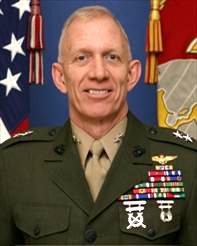“Cyberethics” is missing from Webopedia’s list of 29 commonly used words that contain the “cyber” prefix. Tellingly, “cyberbuck,” “cyberbully,” “cyberjockey,” “cybernaut,” “cyberprise,” “cyberslacking,” “cybersquatting” and “cyberzine” are included and defined, but not “cyberethics.”
Embedded in Wikipedia’s rather cryptic and banal definition of cyberethics — “the philosophic study of ethics pertaining to computers, encompassing user behavior and what computers are programmed to do, and how this affects individuals and society” — are a plethora of exceptionally sticky wickets.

U.S. Marine Corps Lt. Gen. Robert E. Schmidle Jr. (Ret.) will discuss some of these exceedingly complex challenges during the final lecture of the Chautauqua Women’s Club’s 2018 Contemporary Issues Forum series, “Ethics in the Age of Cyber,” at 2 p.m. Saturday, Aug. 25, in the Hall of Philosophy.
Currently, Schmidle is university adviser on cyber capabilities and conflict studies, as well as professor of practice in the School of Politics and Global Studies at Arizona State University. He also serves as one of four core faculty at ASU’s Center on the Future of War. Dividing his time between Phoenix and Washington, D.C., he teaches as a guest lecturer.
At Georgetown University, Carnegie Mellon University, the University of Pittsburgh and elsewhere, Schmidle has given invited lectures about the implications of emerging technologies and the way they affect our moral and ethical choices.
In June, he spoke at two conferences in Vienna, Austria. At the first, he said he spoke to NATO officers, policy wonks and academics about the role of perception in strategic analysis.
“I try to understand how perception — the biases we bring to anything — affects decisions,” Schmidle said.
At the second conference in Vienna, he said he lectured about strategic surprise.
“Why is it that we at the nation-state level seem to be surprised by events and conflict?” Schmidle said. “I argued for critical thinking and challenging assumptions.”
In addition to his academic and advisory work, Schmidle provides tactical flight support to Florida-based Draken International.
According to its website, Draken owns and operates the world’s largest commercial fleet of ex-military fighter aircraft and provides contract air support to implement the military objectives of the United States and its allies around the globe.
As part of his “adversary air” work for Draken, Schmidle said he flies tactical jet fighters against the weapons schools of the Marine Corps, Air Force and Navy.
“I simulate the tactics of an enemy to train new weapons officers,” Schmidle said. “Air-to-air combat is complex. It’s visual. It’s the creation in your mind of a design of a piece of sky and what all the planes look like in the sky. So when you are in that situation, you have some idea of where they come from.”
For more than 35 years, Schmidle has taught advanced fighter tactics. A graduate of the Naval Fighter Weapons School — also known as TOPGUN — he served as a fighter pilot, chiefly of F-4s and F-18s, on multiple tours during the first 25 years of his Marine Corps tenure.
Altogether, he has spent nearly 4,700 hours flying tactical fighters, and flown every aircraft the U.S. Marine Corps owns, including the F-5.
For valor in combat during the Gulf War (Operation Desert Storm) — in which he was the executive officer of Marine Fighter Attack Squadron 333 (VMFA-333), consisting of F/A-18 Hornet strike fighter aircraft — Schmidle was awarded the Distinguished Flying Cross (with combat V). On the first night of the war, he led the Marine Corps’ largest strike.
In addition to TOPGUN, Schmidle is a distinguished graduate of the Marine Corps War College, and a distinguished graduate and former faculty member of the Marine Corps Command and Staff College. Both are part of Marine Corps University at Marine Corps Base Quantico, Virginia.
Before being “plucked to be commander of the Warfighting Unit from 1997 to 2000,” Schmidle said he “taught strategy, planning and tactics at Marine Corps University.”
While leading the Special Purpose Marine Air-Ground Task Force (Experimental) as a colonel, he planned and executed the Marine Corps Warfighting Experiments. Schmidle said this work included “exploring algorithms to aid in decision-making and ways to enhance mental and intellectual performance under stress.”
As he progressed through all but one of the Marines’ five upper-level commissioned officer ranks — from colonel to brigadier general to major general and finally to lieutenant general — undertaking increasingly challenging and far-reaching responsibilities in the U.S. and overseas, Schmidle studied moral philosophy and social psychology whenever feasible.
“I try to subscribe to the notion that you can be a thinker and a doer at the same time,” Schmidle said. “We tend to stovepipe people as one or the other. Antoine de Saint-Exupery, who wrote The Little Prince, was a writer and doer. … He was a fighter pilot.”
For Schmidle, deep academic immersion and operating fighter aircraft provide an “interesting tension.”
Having grown up in Newtown, Connecticut, he had majored in history at Drew University in Madison, New Jersey, and concentrated on 19th- and early 20th-century European history. In 2002, Schmidle graduated from American University with a master’s in philosophy.
While at AU, he said he began focusing on the Austrian-British philosopher Ludwig Wittgenstein. Wittgenstein’s primary work encompassed logic and the philosophy of mathematics, of mind and of language.
His secondary work included the concept of “hinges” — basic, ineffable certainties that typically are not examined because they “go without saying.”
“Hinge beliefs are nonexperiential beliefs, like the hinges on a door,” Schmidle said. “They explain how we act and behave.”
While earning his master’s, Schmidle said he applied the hinge theory, in particular, to “positioning theory,” which is a development in social psychology that emerged in the 1980s, mainly in gender studies and women’s literature.
In his 2010 paper in the Journal for the Theory of Social Behavior, “Positioning Theory and Terrorist Networks,” he defined this new theory as “the study of the way rights and duties are ascribed, attributed and justified to and by individuals in local social groups.”
According to Horace Romano Harré, the chair of Schmidle’s thesis committee (and of his doctoral committee years later), “the systematic study of the interplay between socially defined rights and duties (positions) and persons in action is Positioning Theory.”
Using this cross-disciplinary perspective, Schmidle explored the way we position ourselves in narrative and in discussions with each other.
For his American University thesis, he examined Napoleon’s behavior at the Battle of Borodino, fought on Sept. 7, 1812, during the French invasion of Russia. With casualties of more than 70,000, this was the deadliest day of the Napoleonic Wars.
“Napoleon was positioning himself in the decisions he made as emperor, and not as the general in charge of the army,” Schmidle said. “That caused him to make bad tactical decisions.”
In undertaking doctoral studies at Georgetown University, Schmidle said he studied 20th-century philosophers, mostly French and European, and applied hinges to moral choices.
“My focus was on how context affects moral choices and how those choices are hinges on the door and we aren’t generally conscious of them,” he said.
In 2010, while Schmidle was working on his dissertation — “The Power of Context in Shaping Moral Choices” — for the Doctor of Liberal Studies degree he would earn in 2015, he continued serving in the Marines. He said he is the only USMC general to have earned a doctorate while on active duty.
As a lieutenant general and the first deputy commander of United States Cyber Command, Schmidle oversaw the defense and conduct of “full spectrum cyber operations” within and beyond the United States. He directed the forces of the USCC and their daily activities, and coordinated the computer attack and computer network defense missions of the Department of Defense.
“I began to think about how these emerging technologies were affecting how we think, and about the way we were using these cyber capabilities,” Schmidle said. “We are in a lot of other countries. I was also in the White House dealing with policy.”
With USCC, said Schmidle, the U.S. had an opportunity to operate in the cyber world; yet as a country, it was just beginning to come to grips with what it was doing.
According to Schmidle, “there are implications for bringing personal and professional biases into conversations.” Thus the first step in thinking critically is to identify one’s biases.
“In my thinking, moral hinges are unconscious biases,” he said. “They influence the way we behave and our moral choices. … We have to get back to the basic principles we live by.”
Schmidle’s concept of “cyberethics” broadens Wikipedia’s definition from the philosophic, to the philosophic and psychological study of ethics pertaining to computers.
In his talk about ethics in the cyber age, Schmidle will further link his academic and practical experience by giving Chautauquans a glimpse into high-level government and military decision-making through stories about the recent past that resonate. All within ethical bounds, of course.
Edited on Aug. 25, 2018




